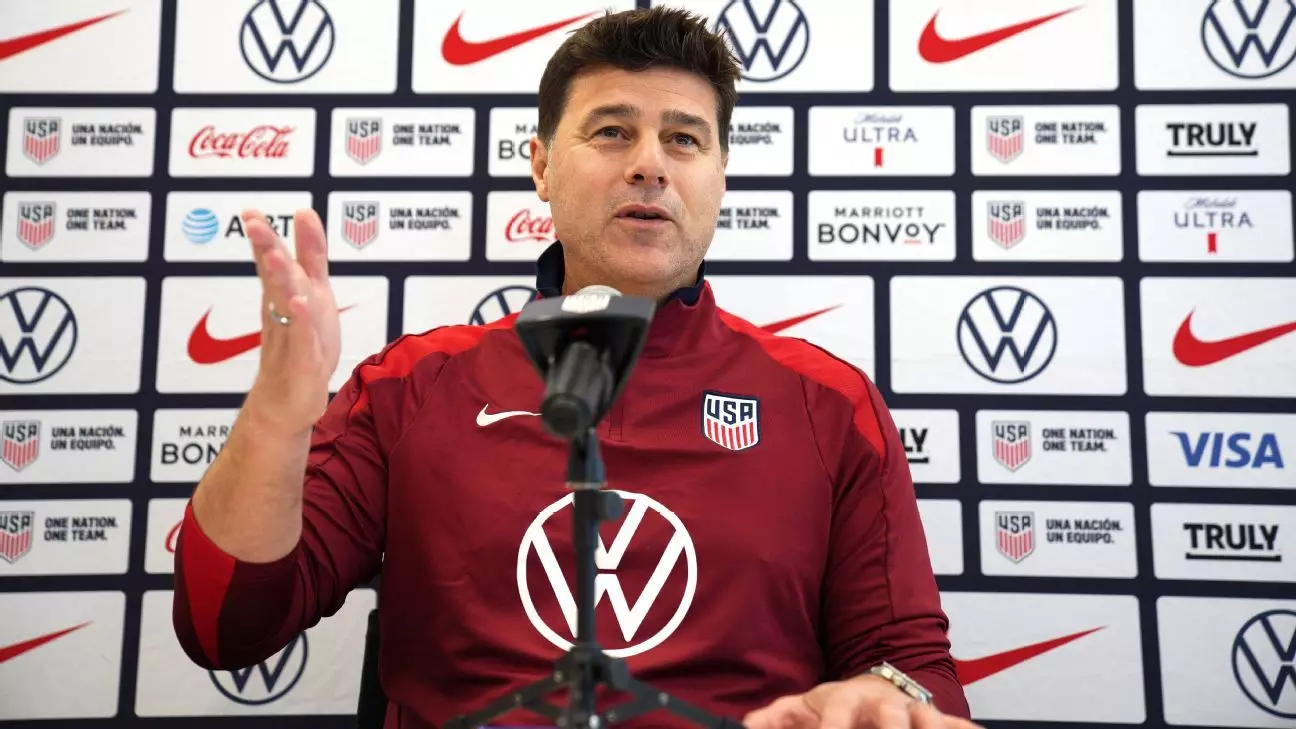As the spotlight continues to shine on American soccer, Christian Pulisic stands out as a beacon of hope and talent. Hailing from the United States, Pulisic’s journey has been one of highs and lows, transitioning from a somewhat tumultuous spell with Chelsea in the English Premier League to a reinvigorated presence at AC Milan. Under the watchful eye of U.S. Men’s National Team (USMNT) coach Mauricio Pochettino, Pulisic’s performances have surged, illustrating not just his offensive prowess but also raising concerns regarding his workload.
With an impressive record of six goals and two assists in just nine matches this season, Pulisic’s role at AC Milan has been nothing short of pivotal. Despite his exceptional performance, Coach Pochettino has voiced apprehensions about the extensive demands placed on the winger. In a recent press conference, Pochettino acknowledged Pulisic’s immense talent but stressed the importance of managing his workload to ensure he remains in peak condition. “We think we need to protect him,” Pochettino said, highlighting the balance between utilizing a star player and safeguarding their health.
This situation raises fundamental questions about how coaches should manage players with significant potential during periods of high performance. Pulisic, who has undoubtedly showcased his skills, must also grapple with the exhaustion that comes from such a demanding schedule. The challenge for Pochettino and his staff lies in ensuring that every player, particularly Pulisic, is in optimal shape for crucial matches.
Pulisic himself has addressed the peaks and valleys of his career, recognizing that the nature of sport means experiencing both ebbs and flows. His newfound success at AC Milan is a refreshing turn after his time at Chelsea, where game time was often sparse, leaving him to question his place within the squad. “You have moments in your career where it feels like everything you touch goes in, and other times where nothing seems to work,” he reflected.
This candid acknowledgment sheds light on the mental fortitude required for elite athletes. For Pulisic, overcoming previous obstacles and channeling his experiences into productive performance at Milan illustrates his resilience. He understands the significance of hard work and dedication, attributing his current form to years of effort and training. It is this combination of skill and mindset that positions him as a leader in the squad and a role model for younger players.
Pochettino’s Coaching Philosophy: Adaptation Over Rigidity
Taking the helm as USMNT’s head coach, Pochettino is tasked with not only nurturing the team’s talent but also establishing a cohesive unit that can compete at the highest levels. He emphasizes the critical nature of relationships within the team, recognizing that fostering familiarity among players and staff members is paramount at the outset. “Getting to know each other and settling the way we want to work is important,” he asserted, underscoring the significance of team chemistry.
In describing his coaching philosophy, Pochettino advocates for flexibility, especially in terms of tactical implementation. His approach contrasts with the rigid frameworks often adopted by coaches, wherein they might hold steadfastly to a preconceived notion of strategy. “I want to live,” he declared, suggesting that adaptability is essential for success. This perspective is vital, particularly when considering the evolving dynamics of the game and the necessity of adjusting to the capabilities of the players at one’s disposal.
Training under a new coach invariably brings about a shift in dynamics, necessitating players to adjust not only physically but also mentally. Pochettino recognizes that success hinges on implementing a regimen that balances physical rigor with thoughtful mental preparation. The mental side of the game can significantly impact how players perform under pressure, and Pochettino’s willingness to adapt offers a safe environment for players to thrive.
In this context, nurturing Pulisic’s confidence is not merely a matter of physical fitness; it also involves reinforcing his mental resilience. Such a nuanced understanding of player management highlights Pochettino’s commitment to holistic coaching, prioritizing the well-being and long-term development of his athletes.
As Christian Pulisic continues to illuminate the soccer landscape, his journey reflects both individual achievement and the collective ambitions of the USMNT. The balance between leveraging his exceptional talent and ensuring he is not overburdened will be a significant factor in his ongoing success. Under Pochettino’s insightful guidance, players like Pulisic may well find their own path to greater heights, paving the way for future generations of American soccer talent. The journey is ongoing, and it remains exciting to watch both Pulisic and Pochettino forge a new narrative for U.S. soccer.

